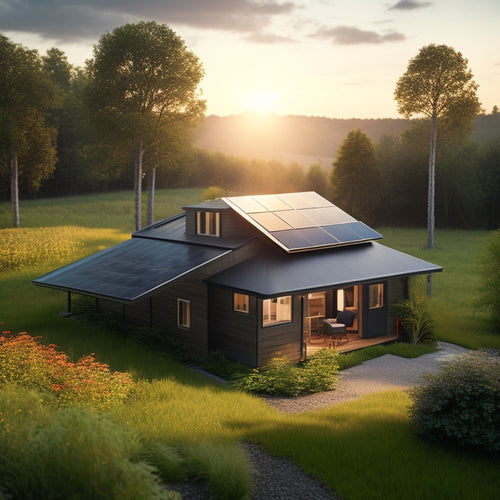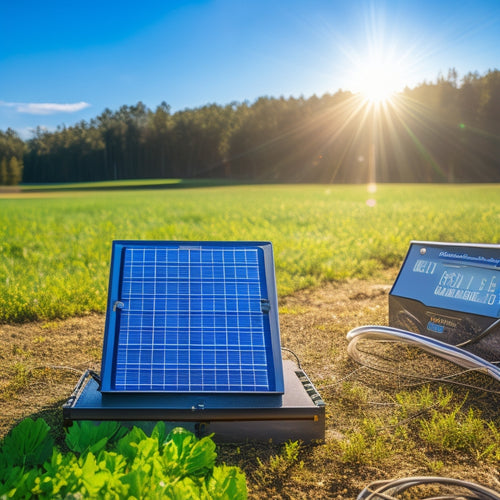
Off the Grid Solar System Packages
Share
You can achieve energy independence with a customized off-the-grid solar system package that combines high-efficiency solar panels, deep cycle batteries, and reliable system sizing. This guarantees zero monthly electricity bills and control over your energy expenses. To get started, you'll need to assess your daily wattage needs by calculating your appliance usage and energy requirements. By selecting the right deep cycle battery, such as lithium or lead acid, and incorporating advanced solar panel technology, you'll guarantee a consistent and sustainable power supply. As you investigate your options, you'll uncover the perfect balance of performance, cost, and environmental impact.
The Essentials
- Off-grid solar system packages require careful evaluation of energy needs, battery selection, and system sizing for optimal performance and cost savings.
- Deep cycle batteries with extended cycle life, such as lithium batteries, enhance system reliability and reduce maintenance costs.
- High-efficiency solar panels with advanced technology maximize energy production per unit area, ideal for limited spaces and reducing environmental impact.
- Accurate assessment of daily energy usage and system sizing prevent outages, ensure consistent power supply, and optimize performance.
- Investing in off-grid solar system packages promotes energy independence, reduces environmental degradation, and supports sustainable living with lower carbon footprints.
Energy Independence Guaranteed Always
You're about to experience the freedom that comes with relying on renewable energy sources, which generate power on your terms.
By utilizing the sun's energy, you'll be powering your lifestyle without being tied to the grid.
With an all-encompassing off-grid solar system, you can break free from the constraints of traditional energy providers and achieve energy independence through a smooth changeover.
This means you'll have the autonomy to live life on your own schedule, without interruptions or dependencies on external power suppliers.
Renewable Energy Sources
Two-thirds of the world's energy consumption still relies on finite fossil fuels, which has led to a pressing need for alternative renewable energy sources.
You're likely aware that fossil fuels have a devastating environmental impact, and it's essential to shift to sustainable solutions. Renewable energy sources, such as solar innovations, offer a cleaner, greener alternative.
With eco-friendly technologies advancing rapidly, you can now utilize the power of the sun to generate clean power. Solar advancements have led to increased renewable efficiency, making it possible to reduce your reliance on the grid.
For instance, Off Grid Solar Panel Kits have become an attractive solution for those looking to unshackle themselves from the grid and utilize the power of the sun.
By investing in renewable energy, you're not only reducing your carbon footprint but also contributing to a future where energy conservation is the norm.
As you consider off-grid solar system packages, remember that green energy is no longer a luxury, but a necessity.
The time to switch to renewable energy sources is now, and you're taking the first step towards a future powered by clean, sustainable energy.
Powering Your Lifestyle
With off-grid solar system packages, achieving energy independence is no longer a distant dream. You can now power your lifestyle with sustainable energy, making eco-friendly choices that reduce your environmental impact. Solar innovations have made it possible to live off the grid, conserving energy and embracing self-sufficiency solutions.
| Lifestyle Adjustments | Benefits |
|---|---|
| Reduced Energy Consumption | Lower energy bills, reduced carbon footprint |
| Increased Energy Efficiency | Optimized energy usage, reduced waste |
| Renewable Energy Source | Zero emissions, sustainable living |
Zero Monthly Electricity Bills
With an off-grid solar system package, you're assured energy independence, which means you'll never receive an electric bill again.
By generating your own renewable energy, you'll offset your energy consumption, eliminating the need for monthly electricity payments.
Additionally, with a reliable Renewable Energy solution, you can guarantee a steady power supply, even during grid outages.
As a result, you'll enjoy zero monthly electricity bills, freeing up your budget for more important things.
Energy Independence Guaranteed
Take control of your energy expenses by opting for an off-grid solar system that guarantees energy independence, effectively wiping out your monthly electricity bills.
With an off-grid solar system, you'll no longer be reliant on the grid, giving you the freedom to live life on your own terms. You'll enjoy the solar system benefits of reduced energy costs and a lower carbon footprint, making sustainable living a reality.
By utilizing the power of the sun, you'll generate clean energy and store it in batteries for later use. This means you'll have a consistent power supply, even during grid outages or extreme weather conditions.
You'll be self-sufficient, relying on yourself rather than the grid, and that's true energy independence.
With an off-grid solar system, you'll have the peace of mind that comes with knowing you're in control of your energy expenses. You'll no longer be at the mercy of rising energy costs or grid outages, giving you the freedom to live life as you see fit.
No Electric Bills
Your off-grid solar system package guarantees that you'll never receive another electricity bill, freeing you from the burden of monthly payments. This means you'll enjoy the comfort of energy security, knowing that your energy needs are met without relying on the grid. With solar savings, you can allocate your resources to more important things in life.
| Monthly Expenses | With Off-Grid Solar | Without Off-Grid Solar |
|---|---|---|
| Electricity Bill | $0 | $150-$300 |
| Energy Security | Guaranteed | Unreliable |
| Carbon Footprint | Minimal | Significant |
Deep Cycle Battery Inclusion
When you're selecting a deep cycle battery for your off-grid solar system, you'll need to take into account the type of battery that best suits your needs, whether it's a flooded lead-acid, absorbed glass mat (AGM), or gel battery.
Each type has its own advantages and disadvantages, and your choice will impact the overall performance and cost of your system.
With the rise of lithium-ion cells in home energy storage systems, it's crucial to weigh the benefits of this technology, including its high energy density and long lifespan renewable energy solutions.
You'll also want to look for batteries with extended cycle life, as this will help minimize replacement costs and guarantee your system remains reliable over time.
Battery Type Options
Selecting the right battery type is essential to the performance and longevity of your off-grid solar system. You'll need to evaluate factors such as energy storage, cost, and environmental impact when making your decision.
When it comes to deep cycle batteries, you have two primary options: lithium and lead acid. Here's a comparison of the two:
| Characteristic | Lithium | Lead Acid |
|---|---|---|
| Lifespan | 5,000-7,000 charging cycles | 2,000-3,000 charging cycles |
| Discharge Rate | 80% depth of discharge (DOD) | 50% DOD |
| Maintenance | Low maintenance, no equalization needed | Regular maintenance, equalization required |
| Cost | Higher upfront cost, but longer lifespan | Lower upfront cost, but shorter lifespan |
Lithium batteries offer several advantages, including a longer lifespan and lower maintenance requirements. However, they come at a higher upfront cost. Lead acid batteries, on the other hand, are more affordable but require more maintenance and have a shorter lifespan. Evaluate your specific needs and priorities when choosing the right battery type for your off-grid solar system.
Extended Cycle Life
Opting for deep cycle batteries with extended cycle life can greatly impact the overall performance and reliability of your off-grid solar system. When you choose batteries with a longer cycle life, you'll experience fewer replacements, reduced maintenance, and lower overall costs. This is especially important for off-grid systems, where battery reliability is essential for consistent power supply.
Deep cycle batteries with extended cycle life are designed to handle the demands of daily charging and discharging. They're built to withstand the rigors of off-grid living, providing you with the freedom and independence you desire.
With proper battery maintenance tips, such as monitoring charge levels and avoiding deep discharges, you can further extend the life of your batteries.
The benefits of extended cycle life also extend to your solar system's longevity. By reducing the need for frequent battery replacements, you'll minimize the risk of system downtime and maximize your solar system's overall performance.
This means you can enjoy a reliable and consistent source of power, without the hassle and expense of frequent maintenance. By investing in deep cycle batteries with extended cycle life, you'll reap the rewards of a more efficient, cost-effective, and sustainable off-grid solar system.
Assess Your Daily Wattage Needs
You need to calculate your daily energy usage to determine the total wattage requirements for your off-grid solar system. This involves identifying the appliances you'll be powering and their respective wattage ratings, as well as the number of hours you'll be using them each day.
By implementing a reliable home energy storage system, you can guarantee a smooth power supply during outages and reduce your electricity bills. Additionally, understanding your energy needs will help you design a more efficient solar panel system.
Daily Energy Usage
Energy independence begins with a thorough understanding of your daily energy requirements. To accurately assess your needs, you'll need to calculate your daily energy consumption. This involves identifying your usage patterns, including the devices you use, their power ratings, and the number of hours they're operated daily.
Make a list of all your appliances, lights, and electronics, including their wattage ratings. You can find this information on the manufacturer's label or in the user manual. Next, estimate the number of hours each device is used daily. For example, if you have a 100W laptop that's used for 8 hours a day, its daily energy consumption would be 800Wh (100W x 8h).
Be sure to include standby power consumption, as many devices continue to draw power even when turned off. You may need to consult the manufacturer's specifications or use a power meter to determine this value.
Total Wattage Requirements
Calculating your total wattage requirements is a crucial step in determining the size of your off-grid solar system. You've already calculated your daily energy usage, now it's time to convert that into a total wattage requirement. This will help you determine the size of your solar array, battery bank, and other system components.
To calculate your total wattage requirements, you'll need to take into account the total daily watt-hours (Wh) you need, as well as the maximum continuous power (watts) required at any given time. You can do this by adding up the wattage of all your appliances and devices, considering their individual power consumption and usage patterns.
Be sure to factor in any potential power surges or spikes, as well as any additional capacity you may need for future expansion.
Accurate wattage calculation is essential for proper system sizing. If your system is undersized, you may experience power outages or reduced performance. On the other hand, an oversized system can be wasteful and expensive.
Higher Efficiency Solar Panels
You'll want to contemplate solar panels with advanced cell technology, which enhances efficiency by reducing recombination losses and increasing photon absorption.
These high-efficiency solar panels can generate more power per unit area, making them ideal for off-grid systems where space is limited.
Advanced Cell Technology
With the constant evolution of solar technology, advanced cell technology has emerged as a breakthrough in the industry, boasting higher efficiency solar panels that maximize energy production.
You'll notice significant improvements in solar cell advancements, resulting in increased photovoltaic efficiency. These advancements enable you to generate more power per unit area, reducing the overall system size and cost.
Advanced cell technology incorporates innovative materials and designs, such as bifacial cells, PERC (Passivated Emitter and Rear Cell) technology, and half-cut cells.
These innovations enhance energy absorption, reduce recombination losses, and increase the overall energy output. As a result, you can expect higher performance ratios, improved durability, and a longer lifespan for your solar panels.
When you opt for advanced cell technology, you're investing in a more efficient and sustainable energy solution.
With higher efficiency solar panels, you'll require fewer modules to meet your energy needs, reducing the overall system cost and environmental impact.
This means you'll enjoy more freedom and independence from the grid, while minimizing your carbon footprint.
Frequently Asked Questions
Can I Customize My Off-Grid Solar System Package?
You can tailor your system to your needs by selecting specific system components, such as panels, inverters, and mounting hardware, and choosing the right power storage solution, like batteries, to guarantee a reliable and efficient off-grid energy supply.
Do Off-Grid Systems Work With Existing Electrical Infrastructure?
You're likely aware that 70% of Americans live in areas with grid access, but did you know you can still tap into off-grid benefits, like energy independence, by integrating your system with existing infrastructure, allowing you to generate and store power locally?
Are Off-Grid Solar Systems Suitable for Extreme Weather Conditions?
You'll want to make certain your solar system can withstand harsh weather conditions; look for weather-resistant components and durable mounting systems that can handle extreme conditions like hurricanes, hail, and heavy snowfall, assuring your energy independence.
How Often Should I Maintain My Off-Grid Solar System?
As you commence this modern-day odyssey of independence, you'll want to ascertain your system's robustness by performing routine maintenance every 3-6 months, thereby securing peak performance and extending system longevity, ultimately preserving your hard-won freedom.
Can I Add More Panels to My System in the Future?
When planning for future expansion, you'll want to guarantee panel compatibility, so you can seamlessly add more panels to your system, increasing energy output and meeting your growing power needs without hassle or unnecessary upgrades.
Final Thoughts
As you cut the cord to traditional energy sources, imagine the freedom that comes with utilizing the sun's limitless power. With off-the-grid solar system packages, you're no longer tied to monthly electricity bills. Instead, you're the ruler of your own energy destiny, relying on high-efficiency solar panels and deep cycle batteries to keep your lights shining bright. Assess your daily wattage needs and take the first step towards energy independence - the sun will do the rest.
Related Posts
-

Renewable Energy Solutions to Reduce Your Carbon Footprint
To reduce your carbon footprint, adopting renewable energy solutions is key. Using solar panels or wind turbines can ...
-

Diy Off Grid Solar
By embracing DIY off-grid solar, you can break free from grid dependence, slashing your energy bills by up to 90% and...
-

Choosing the Right Solar Power Charge Controller
Choosing the right solar power charge controller is crucial for maximizing energy efficiency and extending battery li...


